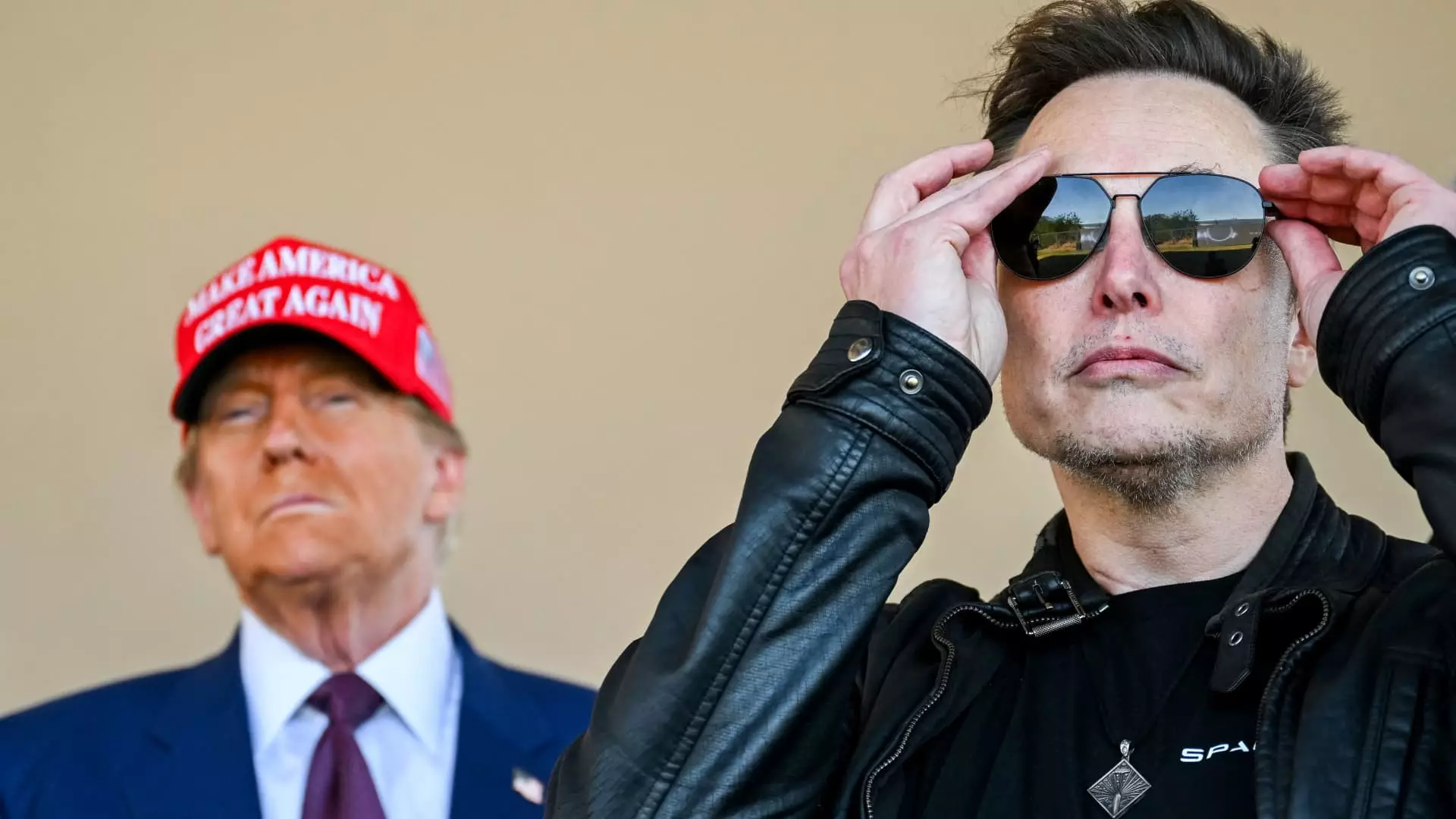Tesla Inc., the renowned electric vehicle giant led by billionaire entrepreneur Elon Musk, has once again captured the financial spotlight with its shares reaching an unprecedented height. On a day characterized by optimism following the recent electoral outcome, Tesla’s stock price soared to an intraday high of $415, eclipsing its prior record set in 2021. The new valuation, which positions the stock as one of the top performers on the market, reflects not just the company’s operational strategies but also the intricate relationship between market psychology and political affiliations.
Investors witnessed a significant rally in Tesla’s stock following Donald Trump’s election triumph, resulting in a staggering 66% increase in the company’s market value since the polling concluded. Such a surge in value can often be attributed to a confluence of factors, including heightened investor confidence, the prospect of favorable policy changes favoring electric vehicles, and, crucially, Musk’s active involvement in political maneuvers that resonate with a considerable segment of the investor community.
Musk’s approach to blending his corporate identity with political advocacy is not new, but the scale of his engagement surrounding Trump’s presidential campaign is noteworthy. Federal Election Commission filings reveal Musk’s considerable financial contributions amounting to $277 million to pro-Trump endeavors, aimed at mobilizing voter registration efforts in key swing states. This intertwining of business and politics poses questions about the implications for corporate governance and strategy in the ever-evolving landscape of American capitalism.
The billionaire’s active role in the Trump administration, particularly as a proposed leader of the “Department of Government Efficiency,” signifies an evolution that could drastically reshape the regulatory framework within which Tesla operates. Musk’s ambition to influence federal regulatory processes encompassing autonomous vehicle approval represents a shift towards a centralized federal approach, a departure from the current state-centric model. The potential for such regulatory overhaul has undoubtedly fueled optimism among investors, prompting analysts to reevaluate their forecasts for Tesla’s financial performance.
The stock market’s pronounced response to these political dynamics underscores a broader trend, where perceptions of future operational success are banked on the alignment of corporate objectives with political support. Analysts from prestigious investment firms, including Goldman Sachs and Bank of America, have revisited their projections, with Goldman’s analysts suggesting an optimistic view of Tesla’s AI innovations as central to its growth narrative. Such endorsements not only boost investor confidence but also prompt a reevaluation of Tesla as a forward-looking technology leader.
However, it is essential to recognize the underlying volatility characterizing Tesla’s historical stock performance. Just months prior, the company faced scrutiny as its shares plummeted by 29%, primarily driven by concerns over competitive pressures and stagnating revenue growth. Such fluctuations highlight the susceptibility of Tesla’s stock to external pressures and internal operational challenges, where the interplay of market expectations and reality can often lead to dramatic contrasts.
Future Implications: Balancing Growth and Governance
Looking forward, Tesla’s trajectory will likely be dictated by a host of factors including the broader political climate, regulatory adjustments, and Musk’s ability to steer the company amidst increasing global competition in the electric vehicle sector. With forecasted growth attributed to innovations in lower-cost vehicles and the promise of autonomous driving technology, Tesla is poised for a potentially transformative year ahead.
Nonetheless, as investors revel in the stock’s recent performance, a cautious approach is prudent. The euphoria surrounding the stock’s ascent must be balanced with an understanding of the underlying risks inherent in its business model. The case of Tesla may serve as an illustrative example of how intertwining corporate success with political tides can usher in both opportunities and challenges, demanding a nuanced understanding of the forces shaping today’s investing landscape.
The confluence of Tesla’s stock performance and the political engagement of its leadership illustrates not only the volatility of financial markets but also the emerging paradigm where corporate and political realms are more interconnected than ever before. As the company steps into a potentially transformative period, both supporters and skeptics alike will be keenly observing the outcomes of this unprecedented relationship.

